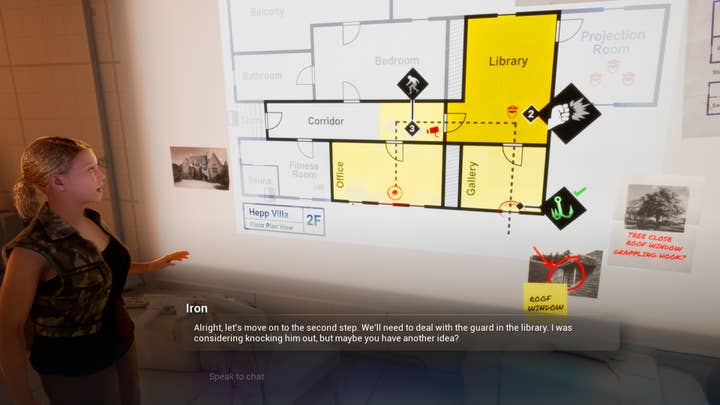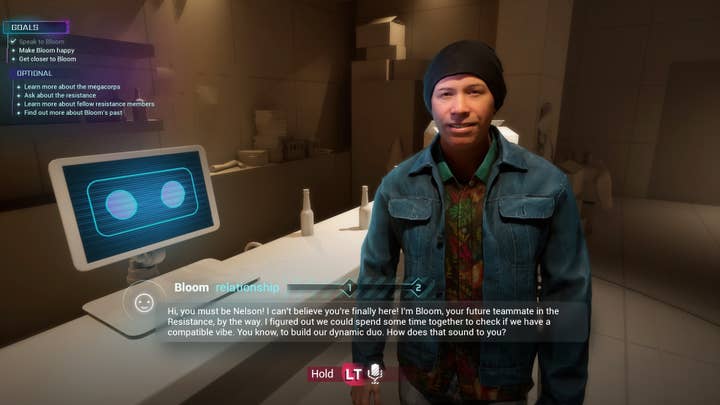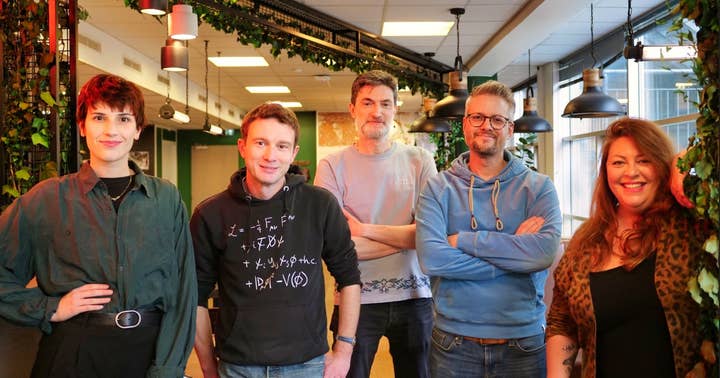Ubisoft: "If there is no value in gen AI for creatives, it is not going to be adopted"
We speak to the team behind Ubisoft's NEO NPCs on the potential and challenges around player-facing gen AI
I wanted to convince Iron to come to the pub.
She is one of Ubisoft's NEO NPCs that we got to meet during GDC last month. Her task was to work with me in devising a plan to break into a building. In the game, we had a big white board in front of us with a map of the building… but I thought we'd have more fun if we did this down the pub.
"We would be more relaxed if we were down the pub," she admitted. "It's a good idea. But we need to focus."
Earlier, I met a different NEO NPC called Bloom. I liked his shirt and told him so. He explained how he bought it in a thrift shop for $8. I was now eager to stop talking about our mission and to head to that store. We ended up discussing how the thrift shop might be a cover for our enemies and that we ought to investigate.
In other words, despite my efforts to derail the game, the NEO NPCs were having none of it. They may as well have said: "Stop your nonsense, we have a game to play."
"It's between total freedom and total control," begins Virginie Mosser, narrative director on Ubisoft's NEO NPC project.
"If we say [this table] is total freedom. We have designed within this area [a smaller portion of the table]. In this area [the NEO NPCs] can go everywhere they want, but they can't go outside it, because that's not interesting for us. This frame is created by the narrative designer and game designer. If you try to take Iron out of the area, she will say 'it's time to be focused'. Maybe we will enlarge that frame… we are scratching the surface of the possibilities. For these NEO NPCs, we wanted them to be limited framed.
"But in a full game, maybe you could go to the pub to discuss the mission."

The use of generative AI is a hotly debated topic from a legal, ethical and artistic point-of-view. Our very own managing editor Brendan Sinclair discussed this very thing last week. In the piece he talked about how text created by gen AI means there is nobody 'human' behind the words, no conscious thought for players to engage with.
But with some games (and many of Ubisoft's games) there is an element that is beyond the creative's control, which is the player. Players may decide to approach a mission in a certain way, or choose to play as evil or good, or skip certain quests entirely. Online multiplayer games have often been about players creating stories themselves, rather than anything scripted. You could argue that NEO NPCs is an extension of giving players that active role in the story.
It's going to come down to the type of game. And Guillemette Picard, Ubisoft's SVP of production, says that this whole area will be ultimately led by the creatives.
"The only way is to have creative and tech people sitting at the same table on the same project," she tells us. "The creatives will drive the show. If there is no value in gen AI for them, it is not going to be adopted. It is going to produce average games. We can't do tech for tech on this one."
The GDC prototype is simply an experiment to see what's possible and how people will react. But this Ubisoft team is convinced there is something here that could transform games.

"We're super excited, but at the same time it is hard to talk about a grand vision of: 'We will have worlds that are more breathable, characters that are more adaptive, and narration that is more reactive'. Because when you say that, it's really hard to understand what is behind it," she explains.
"I wish I could give a grand vision, I am pretty sure it will be drastically different, and it will change AAA, mobile, and smaller games. Because there is no reason why it would be one or another."
The opinions on the NEO NPCs have been mixed. I felt there's something interesting here (with clear room for improvement), but the reaction from outside GDC has been more dismissive.
"The response has been similar to our playtests," Picard says. "Some are surprised, some of them it takes a bit of time to fully accept the game. There remains questions, like, is it niche? Is it wide? And we don't know yet.
"I was surprised by the turnout to [our GDC talk]. There was a long line, and we couldn't host everyone. So we can see that this is a topic with many uncertainties and people are super interested in it."
She adds: "What we've found with this experiment, if you don't get hands on, it's hard to imagine what you can do. We really see a difference between the people who have experimented with it, and those who have heard about it. We look forward to putting it on the market and getting people playing it… because it is hard to tell this story."
"As a writer, the challenge is to let it go. Now it's about player centricity. They are building their own story"
Virginie Mosser, Ubisoft
One of the chief concerns around the use of gen AI is what it might mean for jobs. If the game can write itself, what does that mean for writers? It's a question that prompted Mosser to get involved in the first place.
"I had my share of doubt, of course," she explains. "I want to work in a job where I can create. That was one of my concerns.
"At the time [of joining the project] I knew nothing about gen AI. So the least I could do was dig and understand what it means for me as a creator. But also, what does it mean for players and the industry? I worked a lot with [data scientist at Ubisoft] Melanie Lopez to understand all this. Generative text… I look at that and I'm like 'ok… what will be my role in this?' And working with Melanie opened a lot of possibilities for me, because I discovered that I will create more, but differently.
"I discovered that traditionally when I worked with a character, I have my routine. But with NEO NPCs, this was huge because there will be improvisation, there will be an emergent story… so how can I guide this NPC in this world full of improvisation with the player? It was super interesting, but also a relief, because I created a lot this year."

Mosser's role when it comes to NPCs is to train the character, set their personality and backstory, and then let AI takeover.
"We did some player tests and they push the NEO NPCs at their boundaries," she explains. "And you can have a conversation with a character and be flirty with them, and it's interesting to see how they react and adjust. Bloom, for example, is designed to be welcoming. But if there's an insult and he reacts negatively, I will tweak his character sheet for him to be more peaceful. This is a long training and iterative process to refine the character."
One of the chief challenges for a writer is to accept that loss of control, Mosser adds.
"When you write something in your own personal work, you are in charge. You manage what they say, where they go, who they hang out with and so on. But, with NEO NPCs you have to step back and be ok with the whole area of emergence and improvisation.
"So, as a writer, the main challenge is to let it go. Now it's about player centricity. They are building their own story. It will be personalised. I am just at the beginning of the story, and now they will have their own, and maybe discover things about my character I didn't know."
'Let it go' to an extent. The job of the writer isn't done once the back story and personality is set. And this might even lead to a new form of creative team, Mosser explains.

"You've got to let it go, but it's not 'let it go' super far from the beginning of what you designed. If Bloom has behaviour that doesn't fit with his personality, it's a question of coherence and we are responsible for that coherence, consistency and quality. It's like a teenager… you can let them go but I'm still in charge. I am there, I am watching, and will [steer] them."
One of the concerns around gen AI is the material in which it is trained on. In an industry that says it wants to be more diverse and welcoming, NPCs trained on language models that are inherently biased may lead to problematic characters that undermine that goal. It is something Ubisoft is acutely aware of.
"I come from AI in different industries where I've been educated on the bias of different data sets and the impact it can have," Picard says. "I've worked in health and financial services, which are extremely sensitive areas, as you can imagine.
"We are lucky to have a very strong inclusion and diversity department at Ubisoft, which gives us insight on how to address some of those topics. They were involved from the beginning with this. Also, to make sure the team has the level of awareness that is needed, you need to have extremely diverse teams. And this team is very diverse, which makes me confident that we're asking the right questions. They're not easy to address, but I am confident that we have the right people who have the right level of awareness."
Mosser adds: "From the beginning what attracted me to this project is that D&I was core to it. We know there are a lot of issues with D&I and accessibility, and so we worked from the beginning with the D&I team. We also work on bias with the data scientists. It all depends on the training. We want to improve their answers. But it's a world full of bias, so there is a case of reproducing the bias of the world."
"What we've found with this experiment, if you don't get hands on, it's hard to imagine what you can do"
Guillemette Picard, Ubisoft
So what's next? Picard says that the tech is progressing fast, although the immediate challenge is to have gen AI working locally. Currently it runs online, which isn't suitable from a confidentiality or environmental perspective. But she's confident they will get there within two years, "or even six months."
But ultimately it comes down to the creatives.
"How long will it be before the creatives see something that will radically change how they think of the gameplay?" Picard asks. "What you saw at GDC is that it does change the way one defines a quest. I trust that with the creative directors that we have internally, that this will progress fast, too."
There is a scepticism around what gen AI will bring and the impact it will have on the creative process. Not every creative will have the same viewpoint, but for Mosser at least, there was a thrill to seeing her characters come to life.
"I am sentimental," she concludes. "The character is in my head, and when I finish a book I am always sad because the character has gone. But here, this character stays alive. This feeling is indescribable, because I never imagined in my life that I'd be able to talk with my character without writing the dialogue.
"I was like 'hello' to a character named Lisa [from Ubisoft's first prototype], and she was like 'hello there, I'm so happy, welcome to the island'. I was shy because I didn't know what she would say. This conversation with Lisa was one of my big moments as a writer."
Sign up for the GI Daily here to get the biggest news straight to your inbox

